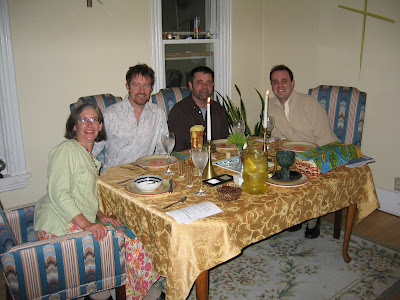
Last night I participated in a Passover seder for Christians hosted by my friend Rev. Robert Caruso, his partner, John, and members of their church, Cornerstone Old Catholic Community. (Regular readers may recall that I conducted an extensive interview with Robert in 2007 about Old Catholicism.)
 At the beginning of our meal together last night, Robert shared the following from Let Us Break Bread Together: A Passover Haggadah for Christians by Pastor Michael Smith and Rabbi Rami Shapiro.
At the beginning of our meal together last night, Robert shared the following from Let Us Break Bread Together: A Passover Haggadah for Christians by Pastor Michael Smith and Rabbi Rami Shapiro.Tonight we sit in special fellowship, honoring each other and God with a Passover meal. We do so for at least three reasons. First, Jesus celebrated Passover, and our Passover links us to him and to the ancient Jewish roots of our own faith. Second, the celebration of freedom, which is at the heart of Passover, is universal, inspiring people of different faiths and even people aligned with no faith to labor for liberation. Third, the personal challenge of Passover – freeing ourselves from personal enslavements of thought, word, and deed – may benefit all of us.
 If we are to benefit from our Passover seder, however, we must be authentic in what we are doing. We must not simply imitate the Passover of our Jewish neighbors. Instead we must engage in our own spiritual liberation. Our seder, therefore, is not an imitation but an adaptation. We draw from Judaism but we do not pretend to be Jews. In this way, we may learn from our deepest historical roots yet remain true to ourselves and our faith.
If we are to benefit from our Passover seder, however, we must be authentic in what we are doing. We must not simply imitate the Passover of our Jewish neighbors. Instead we must engage in our own spiritual liberation. Our seder, therefore, is not an imitation but an adaptation. We draw from Judaism but we do not pretend to be Jews. In this way, we may learn from our deepest historical roots yet remain true to ourselves and our faith.Our meal is called a seder, from the Hebrew term for “order.” The Book of Genesis tells us that God orders all creation. Through we affirm this is so, we must confess we often cannot sense God’s ordering presence. Our own habit of trying to control things for ourselves gets in the way. Paradoxically, the more we seek to control things, the more they spin out of control.
 The story we tell on Passover is one of human control and divine liberation. Egypt symbolizes our enslavement to power, the kind of bondage that results from our seeking to control our own lives. Pharaoh symbolizes our addiction to power and to the need to control. The Jewish people symbolize all of us who are enslaved in some fashion to the ego’s need to control. The entire Passover meal is a celebration of our rediscovery of God’s order and the liberation that comes when we refocus our attention on the only things we can control: our decision to surrender control of our lives to God.
The story we tell on Passover is one of human control and divine liberation. Egypt symbolizes our enslavement to power, the kind of bondage that results from our seeking to control our own lives. Pharaoh symbolizes our addiction to power and to the need to control. The Jewish people symbolize all of us who are enslaved in some fashion to the ego’s need to control. The entire Passover meal is a celebration of our rediscovery of God’s order and the liberation that comes when we refocus our attention on the only things we can control: our decision to surrender control of our lives to God.

See also the previous Wild Reed posts:
Out and About - April 2007
The Old Catholic Church: Catholicism Beyond Rome
The Declaration of Utrecht

























No comments:
Post a Comment